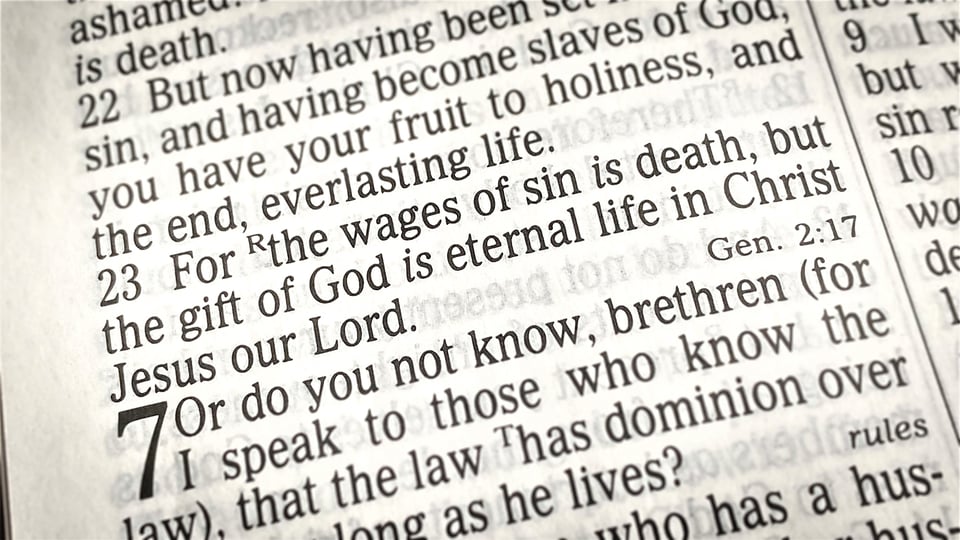What Is the Meaning of Romans 6:23: “The Wages of Sin Is Death”?
Romans 6:23 is a verse sometimes used to scare people about hell and encourage them about heaven. But what does Romans 6:23 really say and mean?

What does Romans 6:23 say?
“For the wages of sin is death, but the gift of God is eternal life in Christ Jesus.”
Regardless, you may have seen Romans 6:23 on an unsolicited church pamphlet, bumper sticker or painted on a rock somewhere along the road.
But what does this verse really mean?
Preachers and theologians have used Romans 6:23 to support the false doctrine that “death” is “living forever in hell,” while “eternal life” is “living forever in heaven”—something that cannot be proved by this verse or any other scripture.
But notice: Nowhere in this verse do the words heaven or hell appear. The belief that after death a person continues to consciously exist in the hereafter is the exact opposite of what Romans 6:23 says.
“Then what is the meaning of Romans 6:23?” someone may ask.
Romans 6:23 can be broken down into two parts: the bad news and the good news.
We will first discuss the bad news—sin and its inexorable penalty. Then we will end with the good news—the promise of eternal life and how one can receive it.
“For the wages of sin is death”
The Bible says, “Sin is the transgression [or the violation] of the law” (1 John 3:4, King James Version). The law in question is, of course, God’s law, especially the 10 Commandments.
“Wages” are earnings—the pay or compensation you get for what you do. They are what you should expect to receive. In other words, what you get for violating God’s law—for breaking the Sabbath, lying, cheating, stealing, etc.—is death.
Notice that it does not say, “The wages of sin is eternal torment in hellfire.” It says death—which means people will perish or cease to exist. The apostle Paul was reiterating a truth that goes all the way back to Genesis 2:17: “But of the tree of the knowledge of good and evil,” God warned, “you shall not eat, for in the day that you eat of it you shall surely die.”
The dead are not off somewhere in heaven or hell, but in the dust of the earth—the grave—awaiting a resurrection.
God declared death to be the penalty for sin—disobeying God—and Paul confirmed that. The Bible says what it means and means what it says.
Enter the serpent, Satan the devil, the father of lies, pushing his counterfeit doctrine. He said, “You will not surely die” (Genesis 3:4).
When these words are viewed in the context of modern-day ideas about the immortal soul and reincarnation, it becomes clear that Satan’s lie continues to reverberate millennia later.
Satan conveyed to Eve precisely what is taught in nearly every religion today: the idea that people are inherently immortal and won’t really die.
We all know the end of the story. Adam and Eve disobeyed and brought on themselves the wages of sin, and because all have sinned, “it is appointed for men to die once” (Hebrews 9:27).
So, where are Adam and Eve and the billions of people who have died over the centuries? As God told Adam, “For dust you are, and to dust you shall return” (Genesis 3:19).
The answer is clear: the dead are not off somewhere in heaven or hell, but in the dust of the earth—the grave—awaiting a resurrection (Daniel 12:2). To explore this topic further, read “Do Humans Have an Immortal Soul?”
The main thrust of Romans 6:23, however, is that sin incurs not only physical death, but also spiritual death. Scripture calls it “the second death” (Revelation 2:11).
Those who willfully sin by rejecting God and His commandments after they have come to the knowledge of the truth will suffer the second death. They will become ashes under the soles of the feet of the righteous (Malachi 4:3).
But there is hope.
“But the gift of God is eternal life in Christ Jesus our Lord”
As the first part of the verse pointed out, the problem is sin. Everyone—male or female, young or old—has sinned and therefore deserves to die (Romans 3:23).
In addition to being under the looming death penalty, mankind has been effectively cut off from God. Notice Isaiah 59:1-2: “Behold, the LORD’s hand is not shortened, that it cannot save; nor His ear heavy, that it cannot hear. But your iniquities have separated you from your God” (emphasis added throughout).
Without some kind of intervention, the relationship could never be mended, and mankind would die in their sins.
Fortunately for human beings, God had a plan in place to save His own creation.
That plan included the sacrifice of His own Son by sending Him to earth as a flesh-and-blood human being to live a sinless life and die in our stead. To learn more about Christ’s sacrifice, read “Why Jesus Had to Die.”
For many, however, this is where the story stops. Aside from making hopeful guesses and an occasional mention of looking into God’s face for eternity (called the beatific vision), they say nothing more.
Immortality is something that is granted without respect to our personal merit—since no one could ever deserve it.
The true knowledge of what happens next—the purpose and destiny of mankind—is virtually never taught from the pulpits.
Not only does the shed blood of Jesus of Nazareth cleanse us from our sins, it also paves the way for us to receive what Romans 6:23 refers to as the free and undeserved “gift of God”—“eternal life in Christ Jesus our Lord.”
Notice it is called a gift—it’s not something you have earned or something you have always had. Immortality is something that is granted without respect to our personal merit—since no one could ever deserve it.
That, however, does not mean that God has a “come as you are” policy or that there are no conditions attached to receiving that gift. On the contrary, the Bible shows there are conditions to receive that gift. Eternal life is reserved for those who:
- Demonstrate repentance by their actions (Matthew 3:8).
- Are baptized (Acts 2:38).
- Have had hands laid upon them by a true minister of God (Hebrews 6:2).
- Put sin out of their lives (Romans 8:13).
- Remain faithful until the end (Matthew 24:13).
When these conditions are met with God’s help, a true Christian can expect to receive the gracious, merciful and unmerited gift of eternal life, which Paul described as something “promised before time began” (Titus 1:2).
(For further information from the Bible regarding when the entirety of this gift will be given, see our articles “What Are the Resurrections,” “Is the Second Resurrection a Second Chance?” and “What Does It Mean to be Born Again?”)
Christians—those who love God and keep His commandments—now have the guarantee or down payment of eternal life through the Holy Spirit. They will not receive the entirety of the gift until the first resurrection, which occurs when Christ returns to earth. Then Christians will be born into the family of God and transformed into glorious spirit beings.
The bright side of Romans 6:23
Romans 6:23 contains both bad news and good news—it is both bleak and hopeful.
In a nutshell, this verse explains that all human beings will face one of two possible outcomes: death or eternal life.
Where a person ends up is totally dependent on his or her own decisions.
The meaning of Romans 6:23 should not cause us to throw up our hands in despair. Instead, we should rejoice in the truth that God desires all people to repent so that they can eventually receive the gift of eternal life (2 Peter 3:9).
Dear readers, please analyze your life and ask yourself: “Is my life going in the direction of the first part of this verse, or the second?”
Date Posted: February 28, 2022



